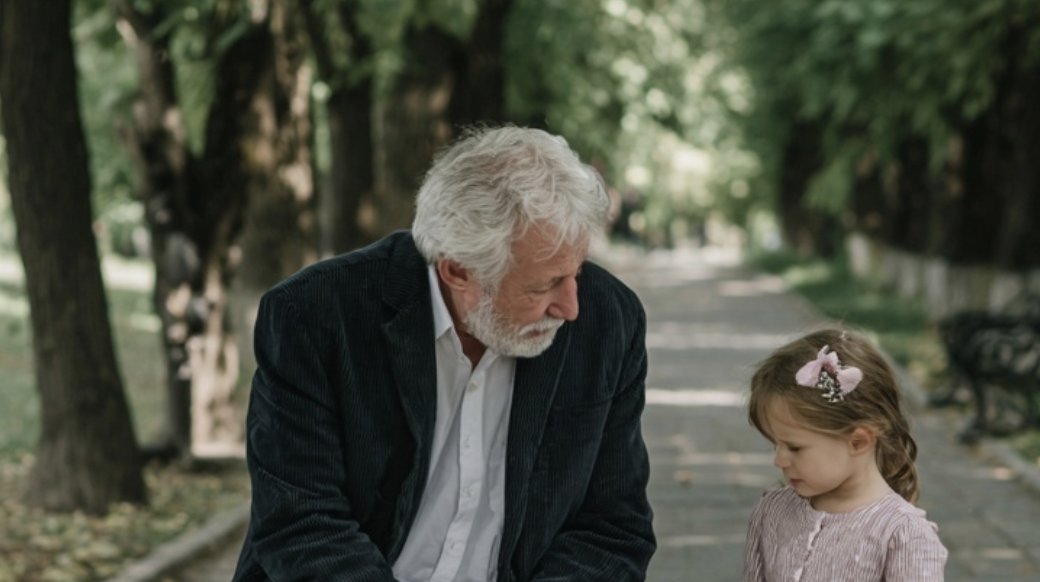The enormous mansion was silent. It wasn’t just big—it was bottomless, like a lake on a moonlit night. Silence hid within its ivy-clad walls—dense, heavy, like a velvet curtain. In that silence lived a single person. His name was Arkady Petrovich. He had everything money could buy, and none of the things that come freely, at the bidding of the heart.
Fate brought him together with a young woman named Liza. The girl could boast neither wealth, nor a roof over her head, nor the warmth of a family hearth. Her world was one of cold basements, windy streets, and strangers’ indifferent eyes.
Between them an agreement was made. Simple—like a mug of hot tea in a hard frost. An old man, worn down by loneliness, proposed that the girl become his relative for seven days. A temporary granddaughter. For a payment that could provide her with a comfortable life for a full twelve months. It all seemed clear and straightforward. But the simplest roads sometimes lead to the most unexpected places.
The moment the young woman stepped over the mansion’s high threshold, the air around her changed. It became different. It wasn’t like the street air—fresh, sharp, smelling of freedom and chance encounters. Here it smelled of money. Of expensive perfume, of old wood polished to a shine, of leather from sofas on which, it seemed, no one had ever sat. And of silence. Muffled, insistent, as if the house itself held its breath, waiting for something very important.
The gray-haired master of the house stood in the middle of the living room, vast as a railway waiting hall built for a single traveler. His hand, with long, refined fingers, gripped the carved back of a massive armchair.
“Come in, Liza,” he said, and his voice sounded unusually loud, breaking the reigning stillness.
She took a timid step forward, and her worn, well-traveled boots left a murky, damp print on the perfect Persian carpet. The maid standing by the wall let out a soft gasp. The girl froze, instinctively bracing for a barked order, a harsh word, humiliation. That was how it always was. That was her life.
But Arkady Petrovich merely made a smooth flick of his wrist.
“Nothing terrible. Carpets are made to be walked on,” he said calmly.
He came closer to her. His eyes, pale blue like a sky veiled by a light haze of clouds, studied her closely. He looked at her not as a person, but as an intriguing object. Here were traces of a hard life under her fingernails. Here the neatly darned knee of her jeans. Here hair that had not yet lost the dust of the street.
“Have you eaten?” he asked.
She nodded silently, though the lunch from the expensive restaurant lay in her stomach like a heavy, undigested lump. Eating while someone watches you intently is no simple task.
The first day passed in unhurried rituals the old man had devised. She was to sit in a deep armchair opposite and listen as he read classics aloud. She was to drink fragrant tea from a delicate porcelain cup, carefully holding it by the thinnest of handles so as not to drop it by accident. Her fingers trembled noticeably from nerves.
“Are you afraid of me?” he asked that evening when, following the established script, she was about to wish him good night.
She lifted her gaze to him. Her eyes were gray—prematurely adult and deep.
“I’m not afraid of you. I don’t understand you,” she answered honestly.
On the second day he led her through the endless rooms of his home. He showed her old paintings in gilded frames, graceful figurines, and told stories about how he had acquired this or that thing. The girl mostly kept silent. Until they entered a small room. Its walls were papered with gentle pink wallpaper, and on one of them hung a modest pastel drawing of a pony. The room carried a light, almost imperceptible dust.
“This is my real granddaughter’s room,” said Arkady Petrovich, and his voice unexpectedly faltered. “My true one. Her name is Alena. A car accident. A year ago.”
Liza looked closely at the neat, empty bed, at the perfectly tucked blanket, and her heart—hardened by life’s blows—shrank with sudden pain. She understood everything. She was not a replacement. She was a living reminder of grief. A visual aid to loss. Look, Grandfather, at whom you lost, and see what you have in her place—me, a girl from the street.
On the third day something unseen broke in the established order of things. At breakfast Liza stopped listlessly poking at the fluffy omelet with her fork and ate it quickly, street-style, almost without chewing. Arkady Petrovich watched her over the top of his unfolded newspaper.
“You eat like a little stray puppy,” he observed without reproach.
“I am that puppy,” she shot back, without lifting her eyes from the plate.
He laughed unexpectedly. Dryly, briefly, but it was the first genuinely sincere sound these walls had heard in a long time.
From that moment they began to talk. At first cautiously, like two strangers who happened to meet on neutral ground. He asked about her life, and at first she lied with the ease of an experienced storyteller. Then she gradually began to tell the truth. About how cold it gets in a damp basement in winter. What cheap—but so coveted—bread smells like. How people laugh at you when you ask them for a little change.
He listened. Without interrupting. His face remained impassive, but deep in his eyes something truly stirred.
On the fifth day, something happened that was in no agreement. As the girl passed a half-open library door, she saw him sitting in his chair with his face buried in his hands. His shoulders trembled softly, almost imperceptibly. She froze on the threshold, not knowing whether she ought to leave or could enter. In that moment the pretenses finally dispersed like smoke. Before her was not a powerful millionaire who had bought himself a moment’s comfort, but simply an elderly, deeply unhappy man.
She walked up slowly and, without a word, laid her small hand—still not fully washed free of street grime—on his gray head. She did not utter the banal “don’t cry.” She simply stood beside him in silence.
He started at the touch, then his large, cold palm covered her hand. There was a feeling of heaviness and endless fatigue.
“Forgive me,” he whispered barely audibly.
“There’s nothing for me to forgive,” she answered just as quietly.
In that very moment the original agreement quietly died. In its place, something entirely different was born. Fragile, tender, and as yet nameless. They began watching old films together, and he laughed at her spontaneous, streetwise jokes. She learned to make his coffee exactly as he liked it—strong, with two spoons of sugar.
On the seventh, final evening, over dinner he said, looking off to the side:
“Please stay.”
There was not a drop of command in his voice. It held a quiet, sincere plea.
Liza looked at him attentively. At this vast house filled with expensive things, yet empty. At this lonely old man in a luxurious cage of marble and gold. Then she looked down at her hands. They were no longer the hands of a girl from the street.
“I am not her,” she said softly but firmly. “I will never be her.”
“I understand,” he nodded, and in his eyes there stood an endless weariness accumulated over years. “But you are you. And that matters.”
In the morning she left. On the table in the spacious entry lay the promised envelope with her payment, but beside it lay another, smaller one. Inside were keys and an official document: a deed gifting her that very room with the pink wallpaper. And a short note written in a confident hand: “Come back whenever you wish. The door will always be open.”
Liza stepped outside. The air once again smelled of wind—of dear and desired freedom. She turned the nearest corner, hands shoved into the pockets of her light jacket. In one pocket lay the thick envelope. In the other—a small, cold key.
She didn’t turn back for a last look at the mansion. But for the first time in many hard years she had a place she could return to. And that realization was worth more than all the money in the world.
The girl did not return the next day. Nor a week later. The envelope of cash gave her a strange feeling—she didn’t even open it. She found an inexpensive hotel, finally scrubbed away the last traces of basement life, and bought herself simple but new clothes—not for the rich house, but for herself. The money gave her what she had never had—choice. And that choice was both frightening and exhilarating.
She wandered the city, and it seemed different to her. Not hostile, but simply… boundless. She went into cozy cafés and learned to make choices, not just take what was handed to her. She sat on park benches and simply watched people, asking nothing of them. She wore the key to the pink room on a simple string around her neck, beneath her clothes. It was cold against her skin, and yet it somehow warmed her from within.
Back in Arkady Petrovich’s vast house, the same silence reigned again. But now it was altogether different. Once it had been the silence of emptiness; now it was the silence of patient, hope-filled waiting. He canceled all his pre-arranged “sessions” with hired actors playing a loving family. He would sit for hours in his chair and look toward the pink room, whose door now stood wide open. He ordered the dust cleared away, the sheets changed, fresh flowers placed. The room was ready to receive a guest who might never return.
Almost three weeks passed. One cold evening, with autumn rain drumming desperately on the windowpanes, the old-fashioned bell at the entry gate rang. Not the modern video intercom through which security usually reported, but that very bell—the one Arkady Petrovich had never replaced, at the whim of the other, true granddaughter.
The maid, surprised by the unexpected ring, reported: “There’s a girl. She says she has a key.”
The old man’s heart fluttered, beat faster. He did not go to the front door. He stayed in the library by the burning fireplace, pretending to be absorbed in an old book. He heard the massive door creak, droplets of rain fall onto the gleaming marble floor from someone’s out-of-season light shoes.
Liza stood in the entryway. She wore simple jeans and a dark sweater; her hair was gathered into a careless ponytail. She looked neither like a girl from the street nor like a guest invited to a rich house. She looked… like herself.
She walked to the library and stopped on the threshold.
“I returned that money,” she said plainly, without preliminaries. “I gave it to the shelter for the homeless by the train station.”
Arkady Petrovich slowly lowered the book onto his knees.
“Why did you do that?” he asked, already guessing the answer.
“Because I don’t want money between us. Any money. Ever,” she explained.
He nodded silently, finally understanding. The purchase had not worked. The deal was null and void. Now they were left alone in an open field, without prewritten rules or scripts.
“You’re soaked,” he noted, peering into her face.
“It’s raining very hard,” she replied simply.
He rose from his chair, went to the fireplace, and took a large, soft woolen throw from the brass stand.
“Come here,” he said—not as an order, but as a quiet, heartfelt invitation.
She approached. He gently draped the warm throw over her shoulders. His hands trembled noticeably.
“Why did you decide to come back?” he asked very softly.
Liza looked at the living fire in the hearth, at the reflections dancing in his once-extinguished eyes.
“Because you left the door open for me. Not because you paid,” came the clear, steady answer.
They stood by the fire in silence. No one uttered the high-flown words “stay forever.” No one dared say aloud the word “granddaughter.” Too much falseness and bitter experience hovered around that word.
“I can come by,” Liza said, looking straight at him. “Sometimes. If you don’t mind, of course. We can drink your coffee with two spoons of sugar. Watch your old films.”
“And what do you want in return?” he asked, out of old millionaire habit.
She smiled—for the first time in all those weeks, truly, with childlike directness.
“In return? You can teach me to play chess. I saw you’ve got a whole shelf of chess books. I’ve always wanted to learn,” she said.
Arkady Petrovich looked at her—this young woman who had come not for money and not out of pity, but because… because she herself wished to. Because between a lonely old man and a lonely girl there had arisen a strange, fragile bond that could not be bought and could not be precisely named.
“Chess?” he chuckled softly. “All right, you win. But I’m warning you now: I don’t give discounts for age or experience.”
“I’m not asking for any,” she retorted, settling comfortably into the chair opposite.
He took out an old chessboard, finely made, of real ivory. His fingers moved over the carved pieces with unexpected tenderness. He set them on the board, and outside the rain kept pouring, shutting their great quiet house off from the rest of the world.
He placed a white pawn before her.
“Make your move,” he said.
And Liza made her first move—not only in the chess game. In someone’s lonely life. And in her own fate. This was far from the end of the story. It was its very beginning.
The chess games gradually became their sacred ritual. The girl came about once a week, always unexpectedly, without calls or warnings. She would tap the door with that very key hanging from her neck, and Arkady Petrovich, sitting in the library, would recognize without fail—by that special tap—that it was her. They drank coffee, played, sometimes simply sat quietly side by side. He taught her not only chess fundamentals, but also the histories of the paintings on the walls and the Latin he still remembered from his youth. She, in turn, taught him to get the edge of street jokes and to see the city beyond the window not as property, but as a living, breathing organism.
One spring day, as bright sun flooded the living room, Liza, contemplating her next move, asked:
“Why don’t you try to get your real granddaughter back? You could find her—you have every means.”
Arkady Petrovich froze with the black queen suspended in the air.
“I was simply afraid,” he admitted quietly, almost in a whisper. “Afraid she would tell me what you told me the very first day. That I’m a stranger to her. That over the long years a real wall has grown between us that no money can break. Here, in the quiet, with you… it was less frightening.”
Liza looked at the chessboard intently, but at that moment she saw not the pieces, but his mute, long-standing pain.
“Fear is a very bad advisor. And rather foolish, too,” she said in her blunt, streetwise tone. “You bought yourself a temporary substitute so you wouldn’t look for the real thing. That was unwise.”
He didn’t take offense. He was used to her frank directness. She was the one person who wasn’t afraid to wound him, because she spoke only the truth.
“What if you help me find her?” he suggested, surprising himself.
And so it became their new, secret mission. Together they began searching for Alena, his missing granddaughter. Liza—with her natural ingenuity and knowledge of how and where to find information—checked old traces on social networks, asked old family friends whose names Arkady Petrovich could barely recall. He, for his part, used his connections and resources to file official requests.
And they managed to find her. It turned out she didn’t live far away at all, but in a neighboring city. Alena worked as a graphic designer, lived alone, and, as it turned out, had also been looking for her grandfather all this time, but was afraid to take the first step, remembering his stern and closed nature.
Their first meeting after many years apart took place in that very house. Arkady Petrovich nervously straightened his tie, and Liza stood in the doorway of the library, feeling both a participant in events and an outside observer.
When Alena entered the living room, she and her grandfather looked at each other in silence, and Liza saw the ice slowly melting in their eyes. They were strikingly alike—just as stubborn, proud, and solitary.
Alena was the first to break the lingering silence, giving a slight tilt of her chin toward Liza:
“And who is she?”
Arkady Petrovich turned, and the look he directed at Liza was so full of warmth and unspoken gratitude that she felt truly warm inside.
“This is Liza. My…” He paused for a moment, choosing the most accurate word. “My savior.”
That evening Liza clearly understood that her mission there had come to an end. The true story—once interrupted—had found its long-awaited continuation. She quietly gathered her few things in the pink room. On the neatly made bed lay the very throw he had draped over her shoulders the first evening she returned.
She went out into the entryway, where Arkady Petrovich was saying goodbye to Alena. He saw Liza with a small backpack in her hands, and his face darkened at once.
“You’re leaving?” he asked.
“Yes,” Liza answered simply. “Your real granddaughter has come back to you. You don’t need a temporary substitute anymore.”
Alena watched them closely, and sudden understanding showed in her eyes. She sensed something in the way her grandfather looked at this strange, spontaneous girl.
“You are deeply mistaken,” Arkady Petrovich said quietly but very distinctly. He came closer and took her hand in his. “You were not—and have not become—a substitute. Never. You are my second granddaughter. One who came to me not by blood, but by…” Again he searched for the right word.
“By her own choice,” Liza prompted.
“By her own choice,” he agreed with relief.
He did not offer her money again or to stay in the house forever. He had finally understood her. Instead, he took from his finger a plain silver signet ring with the family crest—not expensive, but old, bearing the memory of generations.
“Take this as a keepsake. So you’ll always remember you have a family. And the door to this house will always be open to you,” he said.
Liza took the ring. It was warm from his hand. She strung it onto the same cord as the key.
Five long years passed. In Arkady Petrovich’s vast house, bright, joyful laughter sounded again. At Christmas, three people sat at the large festive table: the gray-haired but noticeably rejuvenated old man, his real granddaughter Alena—who now visited often—and Liza.
Liza did not live in the pink room permanently. She rented a small but cozy apartment and enrolled in university to study psychology, to help children as lost and lonely as she had once been. But once a week she unfailingly came to this house. She and Arkady Petrovich still played chess. Now she beat him very often.
One winter evening, looking at a lost game, he said with a slight smile:
“Well now, you’ve grown much stronger than I am. There’s nothing left for you to learn from me.”
Liza shifted her gaze from the chessboard to him—to the wrinkles in which her youth seemed to sink, to the eyes that no longer held their former emptiness.
“You’re wrong,” she objected. “There’s still something to learn. You can teach me… how to be part of a family. A real family.”
Arkady Petrovich reached across the chessboard and covered her hand with his own—old, but still steady. The key and ring on the cord at her neck chimed softly and melodically.
“That,” he said very quietly, “we learn from each other. All our lives.”
Beyond the large window, soft white snow was falling, gently wrapping the huge house that had once been so lonely—now filled at last with true warmth of the soul. Not purchased, not hired with money, but given by fate. Freely. By mutual, sincere choice.



